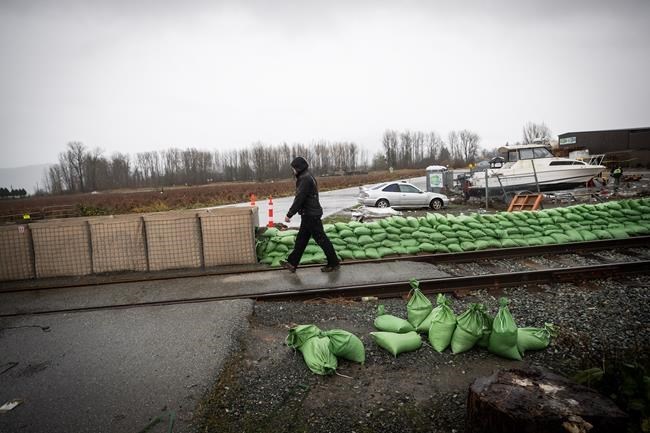
Bins of sand are placed across the road next to a wall of sandbags along rail tracks to form a temporary dike in the Huntingdon Village area of Abbotsford, B.C., Sunday, Nov. 28, 2021. An evacuation order has been issued for Huntingdon Village because of danger to life from potential flooding of the Nooksack River across the Canada-U.S. border in Washington. The same area flooded nearly two weeks and water had since receded. THE CANADIAN PRESS/Darryl Dyck
Republished November 29, 2021 - 5:25 PM
Original Publication Date November 29, 2021 - 1:06 AM
VICTORIA - Fuel rationing in parts of British Columbia was extended Monday for another two weeks until Dec. 14 to allow crews to bring the Trans Mountain pipeline back online after a series of devastating storms, floods and slides in the southern part of the province.
Public Safety Minister Mike Farnworth said the province also extended the provincial state of emergency until the same date in order to ensure essential services continue, with more potentially disastrous weather forecast for the coming days.
The pipeline has been shut down since Nov. 14, when a storm known as an atmospheric river hammered parts of southern B.C., flooding communities and farmland and washing away roads and bridges.
“We need to stay the course for another two weeks until we have the Trans Mountain pipeline back online,” said Farnworth at a news conference. "The fuel conservation measures are working. They are temporary and we will drop these measures as soon as we are able to."
Drivers are being asked to continue to limit their purchases of fuel to 30 litres per visit to a gas station.
Energy Minister Bruce Ralston said the pipeline provides most of the fuel for B.C.'s Lower Mainland and Vancouver Island, but supplies are now being shipped in by rail from Alberta and on barges from the United States.
"This has provided a supply of fuel to compensate for the product that would usually come from the Trans Mountain pipeline while the company works toward restarting the line," he said.
Ralston said Trans Mountain is making sure the pipeline is safe to operate before it starts again, but it will be at reduced pressure.
No one from Trans Mountain returned a request for comment.
A third storm in the last few days forecast for late Monday and Tuesday for parts of Vancouver Island, coastal B.C. and the Lower Mainland had the government warning about further floods and road closures.
Farnworth urged people to be prepared to leave their properties if evacuation orders are issued.
He said the latest storm is forecast to cover a larger swath of the province, with huge rainfall amounts capable of raising floodwaters on B.C.'s Central Coast, especially the Bella Coola Valley.
"For all British Columbians, please check forecasts and warnings from Environment Canada regularly this week."
Transportation Minister Rob Fleming said the Trans-Canada Highway between Abbotsford and Chilliwack remains closed, but highways 3, 7 and 99 are open and drivers are urged to travel only if necessary during the coming storm period.
Fleming said getting rail traffic through B.C. was continuing to present challenges for both Canadian National Railway Co. and Canadian Pacific Railway Ltd.
CN halted freight traffic on the weekend due to weather conditions, while CP was able for the first time last week to get fuel and grain to Vancouver, Fleming said.
"Unless it is absolutely necessary, I would encourage you to stay off the roads through this next storm event," he said.
Environment Canada warned that up to 200 millimetres of rain could drench the Central Coast and parts of Vancouver Island through to Wednesday.
Meteorologist Armel Castellan said the three consecutive storms, and the potential of melting snow from higher elevations, could result in more flooding.
"It's not just a rain event," he said. "It's not just a snow melting event. It's also a successive storm event. It will be problematic because they are coming so close back to back, with the runoff and the saturated soil."
Between 50 and 100 millimetres of rain was expected for Metro Vancouver, the Fraser Valley, Howe Sound, Whistler and the Sunshine Coast.
The weather office said more than 100 millimetres of rain drenched the Fraser Valley city of Abbotsford over the weekend.
A flood warning remained in effect for the Sumas River through Abbotsford, where rising levels forced crews to set up a portable dam Sunday night to protect a key stretch of Highway 1. The highway in that area remains closed.
Abbotsford Mayor Henry Braun said the focus was on flooding of the Nooksack River in Washington state because its high waters have the potential to further inundate low-lying areas in his jurisdiction.
He said Monday he's hopeful repairs done on an Abbotsford dike will hold after the Nooksack River overflowed, sending water across the border.
Braun said sandbagging efforts by local volunteers and Canadian Forces soldiers appeared to be holding back the water.
"I'm quite confident, unless we get a 200-mm dump Tuesday and Wednesday," said Braun. "That's a whole different ball game then."
Flood warnings have been issued for the Coldwater, Coquihalla, Nicola and Tulameen rivers, which all caused serious flood damage earlier this month to cities and towns along their banks, including Merritt, Spences Bridge, Princeton and Hope.
This report by The Canadian Press was first published Nov. 29, 2021.
News from © The Canadian Press, 2021